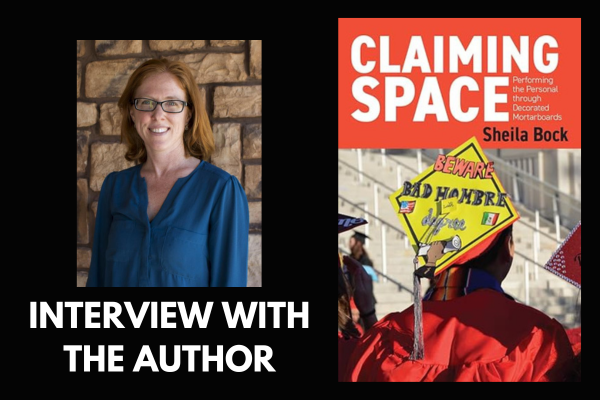Interview with Sheila Bock on the Release of "Claiming Space"

The Center for Folklore Studies celebrates the publication of Claiming Space: Performing the Personal through Decorated Mortarboard, a work by Sheila Bock, a folklorist and OSU alumna. Her work is has been accessioned to the CFS archival collections. Sheila is currently an Associate Professor in the Department of Interdisciplinary, Gender, and Ethnic Studies at the University of Nevada, Las Vegas. In the following interview with CFS Graduate Research Assistant Zahra Abedinezhad, Sheila provides insight regarding her book.
Interview with the Author, Sheila Bock
by Zahra Abedinezhad
How did you arrive at this project?
I started paying attention to decorated mortarboards when I was a new faculty member attending my first commencement at the University of Nevada, Las Vegas in December 2011. After a few years of admiring the fun, poignant, and often hilarious ways graduates would transform the tops of their caps into rich sites of self-expression, I started collaborating with Cassie Patterson, who was then the Associate Director of CFS, to document and digitally archive the diverse forms this expressive tradition would take (#GradCapTarditions). I also sought to understand how and why graduates chose to engage in this expressive tradition through interviews and an online survey. As I learned about the perspectives of graduates from different institutions of higher education in different parts of the country, I came to recognize how these material sites of display, while seemingly “trivial,” were in fact engaging with serious issues surrounding higher education in the United States, issues including belonging, citizenship, and the promises of the American Dream. That recognition motivated me to write the book.
What is the significance of the title?
Whether their designs are carefully planned or thrown together at the last minute, graduates who wear decorated mortarboards are putting curated aspects of themselves on public display. As graduates I talked to shared their thought processes in crafting the designs of their caps, I came to recognize the often complex dynamics shaping these caps and to approach them as performances of the personal. Also, as I discuss in the book, the commencement ceremony is highly formalized and scripted event that functions not only as a rite of passage, but also a rite of intensification — meaning the different scripted features (e.g., designated roles of different participants, conventions for how to move one’s body, ceremonial costume) work together to perform the core values of the institution — and, by extension, dominant cultural narratives surrounding the purpose and value of higher education. Claiming the space of the mortarboard, a key symbol of this ritual event, creates opportunities for individuals to articulate the purpose and value of education on their own terms.
Where do you hope this book finds a home?
While I hope this book finds itself on the shelves of my colleagues in folklore studies and related fields, I intentionally wrote this book to be accessible to undergraduate students. As I note in the book, my own understanding of this topic was heavily informed by the insights shared with me during the many conversations I had with (mostly recent) college graduates. From the beginning, then, my goal was to write a book that undergraduate students who are relatively new to the study of traditional expressive culture can both learn from and enter into conversation with.
What kind of impact has CFS had on you and your work?
Beyond the practical skills I learned working as the graduate student assistant and archivist during my time as a student at Ohio State (skills I still use today), I am most grateful for how CFS has served as a model for what a supportive intellectual community can look like in practice. That is not something that can be taken for granted.
Any final note or suggestions for folklorists?
One of the biggest strengths I see in our field is our willingness to engage seriously with the trivial, to stop and pay attention to the acts of expression that fall outside of the seemingly more serious stuff of culture. I am grateful to be part of a field that recognizes the value of the trivial and the work in does in our complex social worlds.
